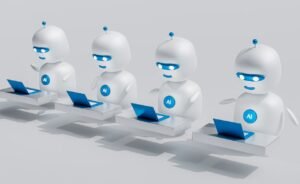What Is an AI Application?
Artificial Intelligence (AI) applications refer to the implementation of AI technology to perform specific tasks or solve complex problems. AI applications encompass a wide range of industries and are revolutionizing the way we live and work.
Key Takeaways
- AI applications are used to perform specific tasks or solve complex problems.
- They are widely used across various industries.
- AI applications are transforming our daily lives and work processes.
Understanding AI Applications
An AI application utilizes artificial intelligence technologies such as machine learning, natural language processing, computer vision, and robotics to perform tasks that traditionally require human intelligence. These applications have the ability to analyze vast amounts of data, recognize patterns, make predictions, and even interact with humans.
**AI applications range from simple tasks like voice assistants** that can answer questions or set reminders, to more complex applications like self-driving cars that use computer vision to navigate roads and make decisions in real-time.
By leveraging AI applications, companies and individuals can automate processes, improve efficiency, enhance accuracy, and drive innovation across various domains.
Types of AI Applications
AI applications can be classified into different types based on their functionality and intended use. Some common types of AI applications include:
- Virtual assistants: Chatbots and virtual assistants like Siri, Alexa, and Google Assistant that can understand and respond to human voice commands.
- Recommendation systems: Applications that provide personalized recommendations based on user preferences and behavior, such as movie or product recommendations on streaming platforms or online shopping websites.
- Image and speech recognition: AI applications that can identify objects, faces, or speech patterns from images or audio input, enabling features like facial recognition, speech-to-text transcription, and more.
AI Application Examples
AI applications are being integrated into various industries, transforming the way businesses operate and individuals interact with technology. Here are a few examples of AI applications in different domains:
| Industry | AI Application |
|---|---|
| Healthcare | Diagnosis assistance systems using machine learning algorithms to help doctors analyze medical images and make accurate diagnoses. |
| Finance | AI-powered chatbots for customer service, providing personalized financial advice and helping with transactions. |
| Manufacturing | Robotic process automation (RPA) to automate repetitive tasks on assembly lines, increasing efficiency and reducing errors. |
| Benefit | Description |
|---|---|
| Increased Efficiency | AI applications streamline processes, automate tasks, and improve overall productivity, reducing human effort and time. |
| Enhanced Accuracy | AI can analyze large volumes of data with precision, minimizing errors and providing more accurate results compared to manual analysis. |
| Improved Decision Making | AI applications can analyze complex data patterns and provide insights to support decision-making processes, leading to smarter and more informed choices. |
| Challenge | Description |
|---|---|
| Data Privacy and Security | The use of personal data in AI applications raises concerns about privacy and the potential misuse or unauthorized access to sensitive information. |
| Ethical Considerations | AI applications pose ethical dilemmas, such as determining liability in autonomous vehicle accidents or ensuring fairness in algorithmic decision-making. |
| Skills Gap | The demand for AI professionals surpasses the current supply, leading to a shortage of skill sets required for developing and maintaining AI applications. |
Conclusion
As AI technology advances, the potential for AI applications continues to grow across industries. From virtual assistants to autonomous vehicles, AI is reshaping our world and unlocking new possibilities. Understanding AI applications and their impact empowers organizations and individuals to leverage the benefits while addressing the challenges that come with this transformative technology.

Common Misconceptions
Artificial Intelligence Application Defined
One common misconception people have around AI applications is that they are limited to humanoid robots with superhuman abilities. In reality, AI applications encompass a wide range of technologies that simulate human intelligence, such as machine learning algorithms, natural language processing, and computer vision.
- AI applications are not limited to humanoid robots.
- AI applications use technologies like machine learning algorithms.
- AI applications encompass natural language processing and computer vision.
AI Applications are Singular in Nature
Another common misconception is that AI applications are all constructed in the same way, when in fact, they can be highly diverse. AI applications can be built as standalone systems or integrated into existing software, depending on the specific use case and requirements.
- AI applications can be standalone systems or integrated into existing software.
- AI applications vary in construction depending on the use case and requirements.
- AI applications are not always built in the same way.
AI Applications are Perfect and Error-Free
Many people believe that AI applications always produce accurate and error-free results. However, AI systems are not infallible and can make mistakes just like humans. These mistakes may occur due to biased training data, limitations in algorithms, or unexpected inputs.
- AI applications can make mistakes just like humans.
- Errors in AI applications can be caused by biased training data or algorithm limitations.
- AI applications are not always perfect and error-free.
AI Applications Replace Human Jobs
There is a misconception that AI applications always result in job displacement and unemployment. While AI can automate certain tasks, it also has the potential to create new job opportunities and enhance human productivity. AI applications should be seen as tools collaboratively working with humans, rather than replacements.
- AI applications can create new job opportunities.
- AI applications are tools meant to enhance human productivity, not replace humans.
- Not all AI applications result in job displacement or unemployment.
AI Applications Possess Human-Level General Intelligence
Some people believe that AI applications have human-level general intelligence and are capable of understanding and performing any task a human can. However, current AI technologies are limited to specific tasks and lack the ability to exhibit true human-level comprehension and adaptability.
- AI applications are limited to specific tasks.
- AI applications do not possess human-level general intelligence.
- Current AI technologies lack the ability to exhibit true human-level comprehension and adaptability.

In recent years, the use of artificial intelligence (AI) has significantly impacted various fields, including healthcare. AI applications in healthcare have transformed the way medical professionals diagnose and treat patients. The following table highlights some remarkable AI applications in the healthcare industry.
| AI Application | Description |
|—————————–|—————————————————————————————————————————————————————————–|
| AI-enabled Diagnosis | AI algorithms analyze medical images and detect abnormalities, assisting doctors in diagnosing diseases such as cancer, heart conditions, and neurological disorders. |
| Robot-Assisted Surgery | Precision robots equipped with AI assist surgeons in complex procedures, improving accuracy and minimizing invasive procedures, leading to faster recovery times for patients. |
| Drug Discovery | AI algorithms analyze vast amounts of data to identify potential drug candidates, speeding up the search for new treatments and reducing the time it takes to develop medications. |
| Personalized Medicine | AI algorithms use patient data and genetic information to tailor treatment plans, optimizing outcomes based on individual characteristics and reducing the risk of adverse effects. |
| Virtual Nursing Assistants | AI-powered chatbots provide 24/7 support for patients, delivering personalized health advice, monitoring symptoms, and escalating emergencies to healthcare providers. |
| Medical Research Forecast | AI algorithms analyze research papers, clinical trials, and patient records to predict future medical trends, assisting medical researchers in making informed decisions. |
| Medical Fraud Detection | AI algorithms identify suspicious patterns and anomalies in healthcare insurance claims, helping insurance companies detect and prevent fraudulent activities. |
| Predictive Analytics | AI systems use historical patient data to predict disease outcomes, allowing clinicians to intervene early, improve patient outcomes, and allocate resources effectively. |
| Remote Patient Monitoring | AI-powered devices monitor patients’ vital signs and alert healthcare professionals in real-time, enabling remote patient care and reducing hospitalization rates. |
| Mental Health Support | AI chatbots provide emotional and psychological support, engaging with individuals and assisting with anxiety, depression, stress management, and general mental health issues. |
## AI Applications in E-commerce
Artificial intelligence (AI) has also revolutionized the e-commerce industry, enhancing customer experiences, improving sales, and streamlining operations. The table below showcases some intriguing AI applications in the e-commerce sector.
| AI Application | Description |
|—————————–|—————————————————————————————————————————————————————————–|
| Personalized Recommendations| AI algorithms analyze customer behavior and preferences to offer personalized product recommendations, increasing engagement and driving sales. |
| Virtual Shopping Assistants | AI-powered chatbots guide customers through the shopping process, providing product recommendations, answering queries, and assisting with purchase decisions. |
| Visual Search Technology | AI systems analyze visual data to identify and match products based on images, making it easier for customers to find desired items and enhancing the overall shopping experience. |
| Price Optimization | AI algorithms assess various factors, including customer behavior, competitor pricing, and demand, to optimize prices and maximize profits while remaining competitive in the market. |
| Inventory Management | AI systems track inventory levels and analyze demand patterns, helping retailers optimize their stock levels, avoid stockouts, and reduce inventory carrying costs. |
| Fraud Detection | AI algorithms analyze customer transactions, detecting fraudulent behavior and preventing online payment scams, enhancing customer trust and security. |
| Voice Assistants | AI-powered voice assistants, like Amazon’s Alexa or Apple’s Siri, provide a hands-free shopping experience, allowing customers to order products using voice commands and queries. |
| Chatbot Customer Support | AI chatbots assist customers with inquiries, complaints, and order tracking, providing quick and efficient customer service 24/7 without the need for human customer support agents. |
| Dynamic Pricing | AI algorithms adjust prices in real-time based on changing market conditions, demand fluctuations, and personalized customer profiles, optimizing revenue and sales opportunities. |
| Customer Lifetime Value | AI models predict customer lifetime value, allowing businesses to prioritize high-value customers, personalize marketing efforts, and increase customer loyalty and retention. |
What Is an AI Application?
Frequently Asked Questions
Question 1
What is an AI application?
Question 2
How does an AI application work?
Question 3
What are some examples of AI applications?
Question 4
How are AI applications developed?
Question 5
What are the potential benefits of AI applications?
Question 6
Are there any ethical concerns associated with AI applications?
Question 7
What challenges are faced when developing AI applications?
Question 8
Can AI applications replace human intelligence?
Question 9
Do AI applications require constant human supervision?
Question 10
What is the future of AI applications?





